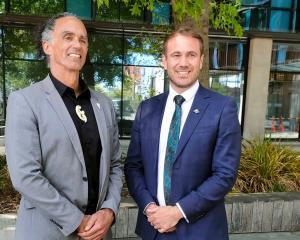
The unnamed man had been receiving monthly injections to manage age-related macular degeneration - an eye condition that caused blurred vision or reduced central vision.
He was then placed on a trial of three-monthly injections, but six months later still hadn’t heard about when his next appointment would be.

But, by the time the man got to see a specialist, after a routine eye examination by an optometrist, it was too late.
The damage was irreversible and the man ultimately lost sight in one eye.
Man ‘one of thousands’ at risk
He was one of thousands of eye patients placed at risk in a climate of stretched resources against growing demand, despite efforts in recent years to highlight the problem, the Health and Disability Commissioner (HDC) said in a report released today.
Following an investigation triggered by the man’s complaint, Morag McDowell found Health Canterbury breached a section of the Health and Disability Services Consumers’ Rights Code.
She said the delay in providing a timely appointment fell well below expected standards.
Health Canterbury has since apologised to the man.
It told the HDC that turnover of senior medical officers continued, leading to difficulties managing the service.
McDowell said staff at Health Canterbury had been flagging the increased demand on the ophthalmology service with senior management since 2016.
Sight lost three years after diagnosis
The man was diagnosed in early 2020 with an advanced form of age-related macular degeneration.
He was transferred to Health Canterbury’s eye clinic to receive regular "Eylea" injections to slow vision loss.
In March 2022 he was told by an ophthalmologist at the clinic that his monthly injections would be changed to a three monthly trial process.
But instead of giving him an appointment then, he was told he would be contacted before the due date of his next three-monthly appointment.
Six months passed without word so the man, who had noticed a change in his eyesight, emailed the clinic to find out when his appointment would be.
Health Canterbury later told the HDC that the man was classed as a Priority 4, or semi-urgent, to be seen within 100 days.
He was placed in the general queue for follow-up.
It was during a routine eye examination in February 2023 that the optometrist told him he could not see into the back of the man’s eye, and recommended follow-up with a specialist.
Consultant ‘horrified’
At an appointment two months later, which the man arranged himself, the consultant who had diagnosed him in 2020 expressed "horror" that his macular had "completely blown" and was now irreparable.
The man was told that if he had received the required injections, it was likely he would still be able to see out of his right eye.
The ophthalmologist who had seen him at the hospital eye clinic acknowledged that there had been delays in follow-up appointments and "missed opportunities" to monitor the man’s vision.
As a result, the man had developed a condition for which there was no prospect of any improvement with treatment.
The specialist consultant who had diagnosed the man, and 10 senior clinicians, wrote to Health NZ in 2022 about their concerns with growing waiting lists in ophthalmology.
The letter sought more funding, more workforce, and outsourcing to the private sector.
Senior doctors tell Health NZ about ‘looming crisis’
A further letter in June 2023 referred to a "looming crisis" in the injection service and sought help to manage the problem, including outsourcing packages of care, and analytical support to understand and plan for future demands.
McDowell said she raised concerns with Health NZ’s national office in October 2023 about the delays in the provision of outpatient ophthalmology services at Health Canterbury.
Health NZ confirmed in November 2023 that 43% of Canterbury’s total wait list of 14,728 patients were waiting more than 10% longer than the clinically requested timeframe.
McDowell said efforts had been made by the health service to manage its concerns about resourcing, but it needed support at a higher level for more sustainable and effective solutions to the serious issues being faced.
She acknowledged the constraints in ophthalmology were complex, but was concerned that capacity issues remained unaddressed, and patients remained at risk.
"There is no doubt, in my view, that senior staff at Health NZ [national office] were on notice about the pressures in the district’s ophthalmology service and the consequential risks for patients," McDowell said.
A year ago, Health Canterbury told the HDC the wait list remained very large, and staffing shortfalls meant patients would still experience delays.
McDowell said the HDC had previously found multiple different providers in breach of the health consumers’ code for the harm caused by delays in the provision of ophthalmology care.
In a list of recommendations, McDowell instructed Health NZ (national office) to report progress to the HDC on a digital patient management system for the ophthalmology service.
Within six months, Health NZ was to provide an update on the implementation of a national incident management system, and development of the national solution for risk management as part of a national standard governance framework.
Health NZ told NZME it recognised the importance of detecting and treating eye issues early for better health outcomes.
It said while there was still work to be done, the recently announced Eye Health National Clinical Network was established to improve access to eye health care for all New Zealanders.
McDowell said she intended to seek a meeting with the leads of the new network to understand its priorities for ophthalmology nationally, its work programme, and the action being taken to improve access to care more generally.
A Health NZ spokesperson told NZME that several initiatives were now under way to improve outcomes for patients.
They included development of a data and digital roadmap for the ophthalmology service aimed at improving patient management systems to help identify patients who were at risk of deterioration through delays.
Health New Zealand said it was committed to developing better reporting of delayed follow-up appointments.
It was also investigating ways to use the medical workforce more efficiently, including utilising services provided by optometrists in the community and in public hospitals.
- Tracy Neal, Open Justice reporter













